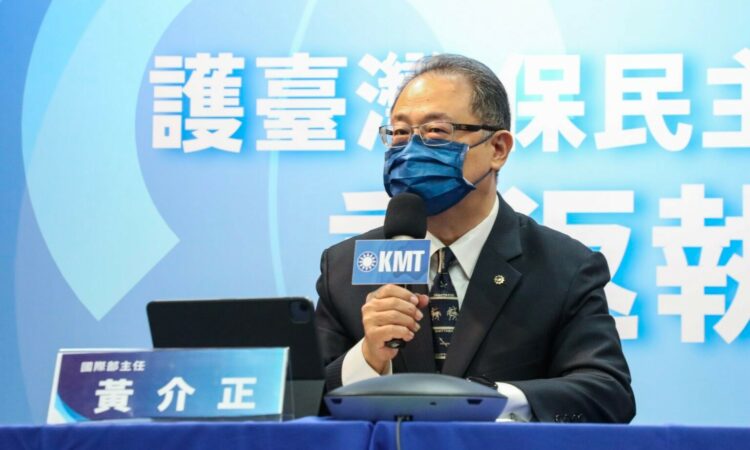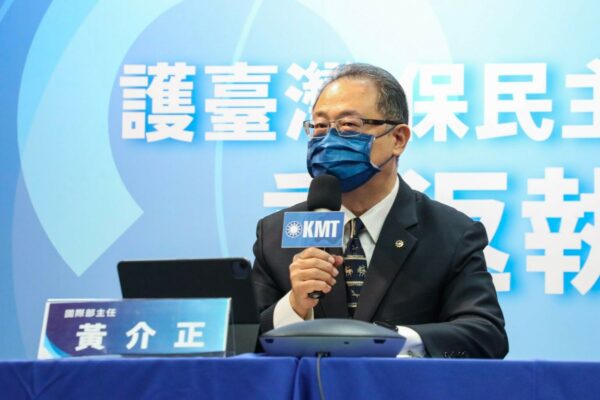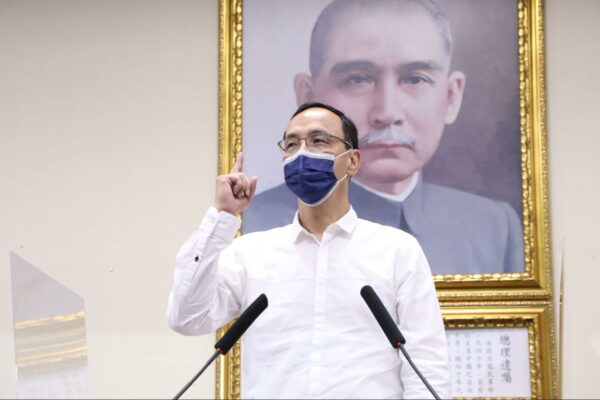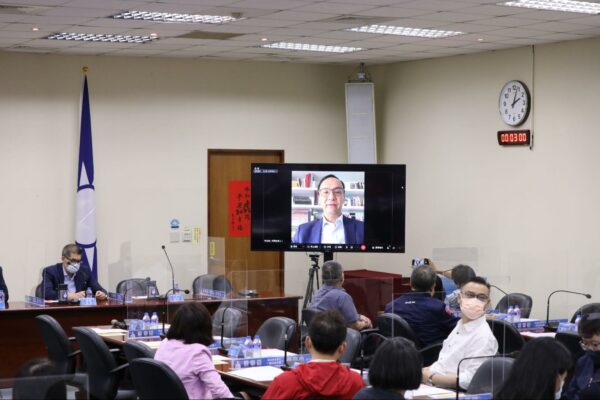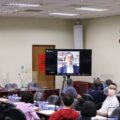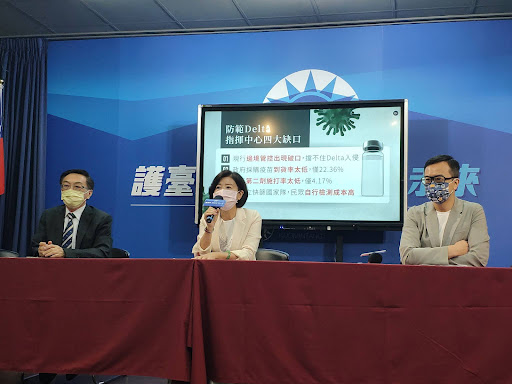
The Kuomintang (KMT) convened a press conference on September 9 entitled “Delta Variant Intruding Taiwan! The Central Epidemic Command Center (CECC) Should Act, Better Late than Never,” with Director Wang, Yu-Min of the Culture and Communications Committee, Chairman Chen Yi-min of the Taiwan Society for Preventive Medicine, Deputy Director Huang Tzu-che of the committee in attendance.
With coronavirus (COVID-19) cases in New Taipei confirmed as the Delta variant after genetic analysis, coming right after the June outbreak of the Delta variant in Pingtung, Delta has once again intruded communities in Taiwan. Yet, the CECC cannot clearly state the source of the infection and cannot reliably control it; the CECC also entirely lacks clear-cut preventative measures against the highly infectious Delta variant. It would seem that the administration of President Tsai Ing-wen can do nothing but watch as the people to go back and forth between epidemic alert levels, unable to return to steady economic livelihood.
In face of the Delta variant intrusion, the KMT identifies the four major shortfalls with the CECC’s epidemic prevention efforts:
(1) Current border controls, which exhibit ruptures, cannot prevent Delta intrusion
The KMT indicates that the two recent clusters of COVID-19 infections, airline pilots and a kindergarten community, have both been confirmed to be the Delta variant. Regarding the current situation, the Delta variant was imported from outside our borders, evincing a significant shortfall in current border control measures. The CECC clearly lowered its guard excessively and failed to adapt to the changing circumstances of the pandemic. The quarantine adjustments of both airline crew members and the general public for entry into our nation brought about an opportunity for the Delta variant to intrude communities in Taiwan.
The KMT emphasizes that the infection source of a New Taipei kindergarten cluster still remains unclear, causing people to suspect that the Delta variant had already intruded the community a while ago. The CECC should make adjustments to border entry quarantine measures by targeting the Delta variant’s specific properties as quickly as possible. Only by confronting the border control problems and resolving oversights can the Delta variant be prevented from entering Taiwan.
(2) Rate of delivered vaccines out of total procured is too low, at 22.36%
The KMT indicates that the government has taken delivery of only 6,666,500 doses of vaccine; the delivery rate is at a mere 22.36%. The amount of vaccines from international and non-governmental donations totals 8,194,000 doses, surpassing the amount procured by the government by a substantial amount. This evinces that the government’s vaccine arrangement policy has lost both effectiveness and capability: over half of our compatriots have not gotten their first dose. While every country’s government was frantically purchasing vaccines, the CECC said that there were enough vaccines to go around. However, the international supply of vaccines is unstable; if procurement is not planned well in advance, the CECC can only rely on the uncertain vaccine sources of international and non-governmental donations. With this uncertainty, how can the CECC guarantee that our compatriots are all able to be fully vaccinated during Delta’s intruding Taiwan this time?
(3) Second-dose vaccination rate also too low, at 4.17%
In the face of the Delta variant wreaking havoc on the whole world, and with the possibility of other variants appearing, the KMT states that every other nation’s government is actively planning protective measures. The United States, the United Kingdom, Germany, France, Japan, and Israel have all arranged for their compatriots or high risk groups to be vaccinated with a third dose. The German government has mandated that students may only take in-person classes after rapid testing with the testing fee covered by the government. On the other hand, the vaccination policies of our nation’s government are chaotic and confusing; although the vaccination rate has reached 44.6%, the vast majority has only been vaccinated with their first dose. Only 4.17% of our people have been vaccinated with a second dose; only 1.5% of seniors over the age of 75, who are eligible for a second shot, have gotten the second dose.
The KMT emphasizes that Minister of Health and Welfare Chen Shih-chung, who heads the CECC, has insisted that everyone first get the first dose. However, numerous expert scholars have already publicly stated that in the face of the Delta variant, only one dose of vaccine is “about as effective as no vaccination at all.” Thus, increasing the number of people with a second dose of vaccine reduces the risks of death, grave medical conditions, and hospitalization, and also allows our nation’s healthcare system to maintain its capacity for attending to patients. Only by vaccinating enough people with a second dose can we prevent the spread of other variants and prevent the people from panicking.
(4) High costs to self-test due to failure to establish rapid testing across Taiwan
Confronted with the highly contagious Delta variant, universal rapid testing should be conducted to root out hidden, asymptomatic COVID-19 cases. However, the KMT states that, according to the recent data collated by the Consumers’ Foundation Chinese Taipei, presently there are five models of home-use rapid tests available domestically in stores. Out of these five models, four are imported, and only one is domestically produced. They are separated into PCR and antigen tests. Two brands utilize PCR, and each test costs NT$1,890 (about US$68). The other three brands employ antigen tests; this type costs between NT$1,700 (about US$61) and NT$1,900 (about US$68) per box, with two to five tests in each box, averaging out to about NT$285 (about $10) to NT$900 (about US$32) per test. Furthermore, the PCR tests that the government employs have a high cost: testing is at one’s own expense, and the average fee of a single test is about NT$5,000 (about US$180) to NT$6,000 (about US$216). The domestic prices of rapid testing are unusually high, so the people are less willing to voluntarily purchase rapid testing kits. We are thus unable to test in bulk in order to root out asymptomatic sources of infection, thus causing the chance that the pandemic situation will continue unabated.
According to the KMT, the CECC should establish a “National Rapid Testing Team” as quickly as possible, which would utilize government subsidies to provide the people with a fixed amount of rapid testing reagents or reduce the cost of rapid testing kits. This would improve the population’s incentives for autonomous rapid testing, thereby rooting out asymptomatic carriers of COVID-19 as quickly as possible, cutting off the chain of infections, and containing the continuous spread of the pandemic.
The KMT states that confronted with the fact that the Delta variant has entered Taiwan, other variants might also intrude in the future. The CECC should adhere to experts’ suggestions, listen attentively to the advice of all parties, and construct even more active, comprehensive preventative measures. In this way, the CECC can resolve its pandemic prevention shortfalls, effectively contain the pandemic, let the people feel relieved and at ease, and help us resume our ordinary lives as quickly as possible.
